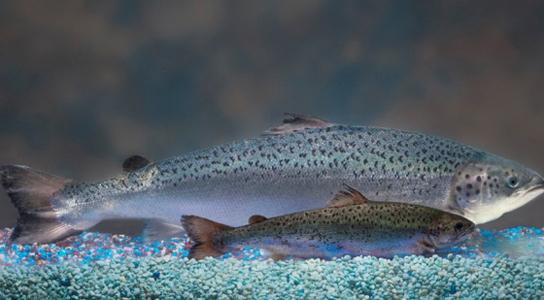FDA green lights GE salmon
AquAdvantage salmon eggs allowed to be sent from Canada to Indiana facility for eventual raising in secure facility.

The Food & Drug Administration announced Friday that it will be deactivating a 2016 import alert that prevented genetically engineered (GE) salmon from entering the U.S.
AquAdvantage Salmon has been genetically engineered to reach a key aquaculture industry growth marker more faster its non-GE Atlantic salmon counterpart. It does so because it contains a recombinant DNA construct that is composed of the growth hormone gene from Chinook salmon under the control of a promoter (a sequence of DNA that turns on the expression of a gene) from ocean pout, another type of fish. This allows the salmon to grow to market size faster.
FDA’s approval of the application related to AquAdvantage Salmon followed a comprehensive analysis of the scientific evidence, which determined that the GE Atlantic salmon met the statutory requirements for safety and effectiveness under the Federal Food, Drug & Cosmetic Act, FDA commissioner Scott Gottlieb said in a statement. However, in 2016, Congress directed FDA not to allow into commerce any food that contains GE salmon until it issued final labeling guidelines for informing consumers of the GE content in the food. FDA complied with this requirement by implementing an import alert in 2016 that prevented GE salmon from entering the U.S.
“As was determined during the FDA’s 2015 review, this fish is safe to eat, the genetic construct added to the fish’s genome is safe for the animal and the manufacturer’s claim that it reaches a growth marker important to the aquaculture industry more rapidly than its non-GE farm-raised Atlantic salmon counterpart is confirmed,” FDA said.
FDA stated that, with the deactivation of the import alert, AquAdvantage Salmon eggs can now be imported to AquaBounty Technologies’ contained growout facility in Indiana to be raised into salmon for food. On April 26, 2018, FDA approved a facility near Albany, Ind., for rearing AquAdvantage Salmon. This secure, land-based tank system in Indiana is AquaBounty Technologies’ sole approved growing facility in the U.S. At the time of the facility approval, Import Alert 99-40 prevented the AquAdvantage Salmon eggs produced in Canada from entering the U.S.
AquAdvantage Salmon, which are all female and effectively sterile, would be raised in a secure indoor facility in freshwater, land-based tanks. Multiple physical containment measures like nets, screens and filters would prevent any fish from escaping. There are a minimum of five -- and sometimes six or -- seven barriers between the tanks where the fish are raised and the facility’s final filtered water discharge to an outside ditch.
Additionally, the environmental conditions around the Indiana growout site are hostile to the long-term survival, dispersal, reproduction and establishment of AquAdvantage Salmon. There are no Atlantic salmon and other salmonids near the Indiana facility, and the watershed where the facility is located ultimately drains to the Mississippi River and the Gulf of Mexico.
Additionally, as part of its approval, te FDA also analyzed the potential environmental impact that an approval of the AquAdvantage Salmon application would have on the environment and published its final environmental assessment -- which found no significant impact -- in November 2015. FDA found that an approval of the application related to AquAdvantage Salmon would not cause a significant impact on the U.S. environment.
FDA’s approval process for intentional genomic alterations (IGAs) in animals is risk based and includes an assessment of several elements, FDA explained. “The FDA is committed to supporting innovation and ensuring safety in the biotechnology space, including the use of IGAs in animals. We’re interested in the promise that newer technologies can have for bringing innovative products such as these to market while also helping to ensure they are safe and effective,” Gottlieb’s statement explained.
The U.S. Department of Agriculture’s Agricultural Marketing Service regulates the labeling of human food from GE salmon, including AquAdvantage Salmon, under the National Bioengineered Food Disclosure Standard (NBFDS).
In light of the NBFDS and its implementing regulations issued on Dec. 20, 2018, FDA is reviewing this draft guidance to consider what additional or new recommendations may be needed for the kinds of products or statements, including claims of non-GE content, that are not covered by the NBFDS.
About the Author(s)
You May Also Like





